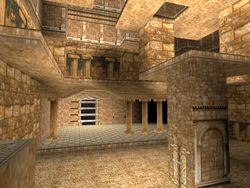St. Francis' Folly
| St. Francis' Folly | |||
|---|---|---|---|

| |||
| Tomb Raider | |||
| Section | Greece | ||
| Level No | 5 | ||
| Length (*) |
| ||
| Secrets | 4 | ||
| Location | Europe, Greece | ||
| Level Chronology: | |||
| Tomb of Qualopec | St. Francis' Folly | Colosseum | |
St. Francis' Folly is the fifth level of Tomb Raider 1 and the first of the Graeco/Roman levels.
Contents
Story
After her confrontation with Larson in Peru, Lara has doubts about the intentions of her employer, Jacqueline Natla. Lara breaks into the headquarters of Natla Technologies, where she finds the diary of Brother Herbert, a medieval monk who was relocated to the monastery of St. Francis' folly. Rumour amongst his brothers stated that the monastery was built on top of the ancient tomb of Tihocan, a legendary ruler of the lost continent of Atlantis. Buried along with Tihocan is his piece of the Scion, an Atlantean artefact with extraordinary power.
Lara travels to Greece to the monastery, which now lies in ruins. She finds Pierre's abandoned camp outside, complete with discarded food cans, and heads into the monastery. While exploring the monastery, Lara finds a passage to an ancient chamber. It lies in ruins, several floors have collapsed making the room several stories high. The chamber contains for shrines, on each to Atlas, Neptune, Thor and Damocles. In each of these rooms she finds a key. Lara proceeds carefully to the bottom of the room, scaring off Pierre along the way, and uses the keys to open the gate leading to the Colosseum.
Objectives
- Access the second part of the monastery.
- Collect the Thor, Damocles, Atlas and Neptune keys.
- Unlock the 4 barrier door leading to Colosseum.
Enemies
Traps & Obstacles
- Collapsing tiles
- Four trap rooms: Thor, Damocles, Atlas and Neptune
Keys
St. Francis Folly
It is doubtful that a monastery would have been built by Franciscan monks in Greece, although the Catholic Venetians did have significant territorial gains in the Aegean sea and on various Greek Islands, eventually conquering as far as Cyprus. St. Francis is supposed to have visited Cyprus [1], making it one of the possible sites for Tihocan's tomb.
The location of Phrygia, which was the kingdom of the mythic King Midas is actually based in inland Turkey. This could suggest then, that all the Greek levels are not actually based in Greece, but in Turkey - but that the structures were built by Asiatic Greeks who colonised parts of Turkey themselves. Whether a Catholic monastery would have been built in Turkey is therefore unlikely, but it is possible that earlier groups of Christians such as the Armenian, Syriac or Greek Orthodox Churches - as the style of the building in Anniversary is certainly not lavish enough to be from the Medieval period.
The name of the monastery - Saint Francis - might refer to the number of animals (lions, crocodiles, gorillas, bats and rats) present within the structure, and not to the saint himself. It could even be a later name for the monastery.
Notes
See individual entries:
References